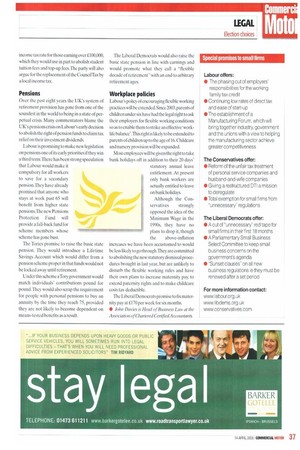t's time to decide
Page 38

Page 39

If you've noticed an error in this article please click here to report it so we can fix it.
As the election looms what are the main parties promising business in return for its
vote? John Davies reports.
Business regulation In the 2005 Budget Labour undertook to slash the number of government inspectorates and regulatory bodies. However. the level of regulation is widely believed to have soared over the past eight years. Labour has promised to bring in new regulations which will enable the NHS to recover the cost of hospital treatment provided to individuals who have successfully sued businesses forcompensation because of injuries suffered at the workplace.
The Conservative campaign will feature a high-prolile war on bureaucratic waste. The Tories also promise to end what they claim to be the practice of 'gold plating' EU legislation and promise to withdraw from what they see as the most burdensome of recent EU business rules.They would abolish 168 public bodies, slash the size of the Department of Trade and Industry and scrap the Small Business Service.
The Liberal Democrats would abolish the DTI toorlhey would liberate Regional Development agencies from control by Whitehall so that what they call the real concerns of business could be addressed at the local level. They would, however, give the Chief Secretary to the Treasury a new remit to represent the business sector as a whole within the Cabinet.
Taxes Labour will boast that under Gordon Brown direct tax rates have remained static. In his recent Budget Brown also responded to strong political pressures by raising the qualifying thresholds for inheritance tax and stamp duty on house purchases.
Labour will certainly seek to capitalise on the Chancellor's personal popularity and his widely held reputation as being a 'safe pair of hands' with the economy by putting him and his record at the centre of its campaign strategy.
The Tories claim they would save il2bn a year by 2007-8 by cutting bureaucracy. The money saved would be used to avoid the need to borrow and to enable them to reduce taxes.
While they have been reluctant to make any firm public commitment to reducing the rates of direct taxes, it seems likely that some concrete promise to lower the rates of income tax and NIC thresholds will be made during the campaign.
The Liberal Democrats will undertake to make taxation simpler and fairer for businesses as well as individuals. But they will be the only one of the three main parties to argue for tax increases. They would bring in a 50p income tax rate for those earning over £100,000, which they would use in part to abolish student tuition fees and top-up fees. The party will also argue for the replacement of the Council Tax by a local income tax.
Pensions
Over the past eight years the UK's system of retirement provision has gone from one of the soundest in the world to being in a state of perpetual crisis. Many commentators blame the UK's pensions crisis on Labour's early decision to abolish the right of pension funds to claim tax relief on their investment dividends.
Labour is promising to make new legislation on pensions one of its early priorities if they win a third term.There has been strong speculation that Labour would make it compulsory for all workers to save for a secondary pension. They have already promised that anyone who stays at work past 65 will benefit from higher state pensions.The new Pensions Protection Fund will provide a fall-back fund for scheme members whose scheme has gone bust.
The Tories promise to raise the basic state pension. They would introduce a Lifetime Savings Account which would differ from a pension scheme proper in that funds would not be locked away until retirement.
Under this scheme aTory government would match individuals' contributions pound for pound.They would also scrap the requirement for people with personal pensions to buy an annuity by the time they reach 75, provided they are not likely to become dependent on means-tested benefits as a result. The Liberal Democrats would also raise the basic state pension in line with earnings and would promote what they call a "flexible decade of retirementwith an end to arbitrary retirement ages.
Workplace policies
Labour's policy of encouraging flexible working practices will be extended. Since 2003,parents of children under six have had the legal right to ask their employers for flexible working conditions so as to enable them to strike an effective 'workLife balance'. This right is likely to be extended to parents of children up to the age of 16. Childcare and nursery provision will be expanded.
Most employees will be given the right to take bank holidays off in addition to their 20 days' statutory annual leave entitlement. At present only bank workers are actually entitled to leave on bank holidays.
Although the Con servatives strongly opposed the idea of the Minimum Wage in the 1990s, they have no plans to drop it, though the above-inflation increases we have been accustomed to would be less likely to go through.They are committed to abolishing the new statutory dismissal procedures brought in last year, but are unlikely to disturb the flexible working rules and have their own plans to increase maternity pay, to extend paternity rights and to make childcare costs tax-deductible.
The Liberal Democrats promise to fix maternity pay at £170 per week for six months.
• John Davies is Head of Business Law at the Associatiollof Chartered CerafiedAccountants










































































































































































































